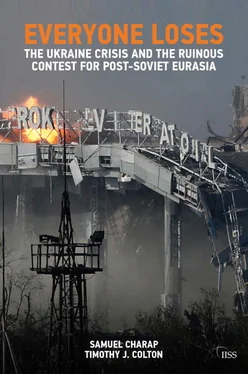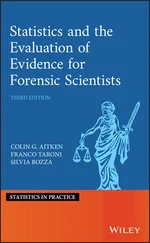The geopolitical, geo-economic and geo-ideational tussle that permeates the In-Betweens has also warped party politics and supplanted democratic discourse with demagoguery. In Moldova and Ukraine, parties and leaders have declared themselves pro-Western to capitalise on popular desire for good government, which many citizens associate with the West. When in power, however, they all too often have proven to be as corrupt and incompetent as their so-called pro-Russian opponents.
Additionally, the contest for influence between Russia and the West has hobbled US and EU efforts to further reform in post-Soviet Eurasia. This is partly a function of practicalities: when geopolitical, geo-economic and geo-ideational issues are at the top of the agenda, other problems fall by the wayside. But at times when the contest is particularly intense, Western policymakers have deliberately downplayed human rights and democracy-related problems for fear of pushing countries into Russia’s embrace. EU backpedalling on conditionality with Yanukovych is one example discussed earlier. The tepid Western reaction to the crackdown on protesters in Tbilisi in November 2007 is another. As Human Rights Watch noted in its report on the incident,
Georgia has been seen as a small but crucial bulwark to counter Russian dominance in the region and as an important ally for the United States. It has also been held up as an example of a successful transition to democracy in the former Soviet Union region. As a result, the US and EU have refrained from criticizing Saakashvili in public and from engaging in robust discussion of the country’s human rights problems. [52] Human Rights Watch, ‘Crossing the Line: Georgia’s Violent Dispersal of Protestors and Raid on Imedi Television’, 19 December 2007, https://www.hrw.org/report/2007/12/19/crossing-line/georgias-violent-dispersal-protestors-and-raid-imedi-television .
Since the Ukraine crisis, this problem has become more acute. As Nelli Babayan notes, ‘the bargaining power of some [regional states] vis-à-vis the West seems to have increased, although their compliance with the rules and norms promoted by the West [has] not meaningfully changed or [has] in some cases even decreased’. [53] Nelli Babayan, ‘The In-Betweeners: The Eastern Partnership Countries and the Russia–West Conflict’, 2015–16 Paper Series, Transatlantic Academy, April 2016, p. 1, http://www.gmfus.org/file/8150/download .
Belarus is a case in point. In February 2016 the EU rolled back sanctions on President Lukashenko and his coterie as well as several state-controlled firms. EU officials will admit that in doing so they ignored Minsk’s non-compliance with Brussels’ stated requirements regarding human rights, on the reasoning that Belarus had become a ‘battleground of powers’. [54] EU officials cited in Ibid. , p. 13.
The US gladly joined the EU effort to placate a man former secretary of state Condoleezza Rice had once called ‘the last dictator in Europe’. In March 2016 a senior Pentagon official travelled to Minsk to meet with Lukashenko and restart a military-to-military relationship that had been on ice for nearly a decade.
All of this saps the West’s ability to push the region’s governments to reform. Soft-pedalling criticism of rulers who pledge fealty also feeds a widespread belief that public censure regarding human rights, democracy or reform is merely an instrument to punish disloyalty. Inconsistency in airing such critiques across countries or over time in particular countries undercuts those officials who do speak out about abuses or push their interlocutors to reform. It is easier for the latter to brush off such concerns if they receive mixed messages or can point to double standards. By treating the In-Betweens as spoils to be won, the West also gives all the region’s leaders a foil against almost any expression of disapproval: the threat of turning to Moscow. In the case of Ukraine post-2014, where such a threat is no longer credible, Western states have been reluctant to withhold public statements of support and financial assistance on the logic that the country cannot be allowed to fail. It is almost as if Ukraine’s rulers are holding their own country hostage and extorting ransom. [55] As one European diplomat put it, ‘[Poroshenko] knows perfectly well that we cannot allow Ukraine to fail, that we have invested a lot in this country, and we need to have Ukraine as a success story. And he is abusing that knowledge. It is infuriating.’ Quoted in Joshua Yaffa, ‘Reforming Ukraine after the Revolution’, New Yorker , 5 September 2016, http://www.newyorker.com/magazine/2016/09/05/reforming-ukraine-after-maidan .
Moving past the negative-sum game
The Cold War was brought to a peaceful conclusion by statesmen impelled by a sense of urgency, a feeling that they were ‘running against a clock’ and that the window of opportunity for decisive action might soon close. The regnant mood in the current crisis is one of resolve to maintain entrenched positions, not urgency about finding a solution. The frozen conflicts of post-Soviet Eurasia, up in number with the addition of Crimea and the Donbas, are mirrored in policymakers’ frozen thinking. Even a well-meaning OSCE Panel of Eminent Persons on European Security as a Common Project, commissioned in December 2014, came up with little that was new. The final report of the panel mostly rehearsed well-known Western and Russian narratives of the post-Soviet period. [56] The Russian representative, Sergei Karaganov of the Higher School of Economics in Moscow, found it necessary to insert a ‘letter of disagreement’ into the document, in which he said he took issue with 24 of the points raised by Western members. The report, ‘Back to Diplomacy’, can be found at http://www.osce.org/networks/205846?download=true .
This historical moment is different from that of a generation ago. There is something to be said for caution, honouring the ‘Do no harm’ principle. But in this case caution has with time settled into stale and unreflective policies. It is high time to revive the debate over the future of post-Soviet Eurasia; to reconnect it with realities on the ground; and to move past summations of the problem, and of the misbehaviour of this or that side, to innovative and realistic proposals for moving past the negative-sum game.
Contestation over the region began unplanned, and remained a low-key affair for more than a decade after the end of the Cold War. With the passage of time, the main external actors became more purposive and disciplined in seeking unilateral advantage. Rather than developing the habit of cooperating to mutual benefit, they regularly aimed for wins at the other’s expense. Instinctual counter-escalation occurred in response, as governments doubled down on their policies, even when those policies were ill-considered and counterproductive. The regional players became less capable of playing the game with nuance, mostly because the outside powers were more likely than before to demand fully fledged commitment to their point of view. [57] This pattern, to be sure, applies more strictly to economic integration than to collective-security groupings.
All in all, zero-sum approaches to geopolitics, geo-economics and geo-ideas stood in the way of mutual accommodation. In turn, they also produced negative-sum results. State boundaries have been redrawn and animosities and even hatreds aroused, while relations among global powers are in tatters.
The sine qua non for a reassessment must be an acknowledgement that both Russian and Western policies toward post-Soviet Eurasia have reached a dead end. For Russia, that means recognition that the zero-sum approach to its neighbourhood has been costly in the extreme, risky and self-defeating. The recurrent resort to coercion, be it political, military or economic, has alienated countries that might otherwise have naturally been drawn to Russia. The US and the EU must acknowledge that, despite success in East Central Europe, further application of the solution of the 1990s – the extension of Euro-Atlantic institutions eastward toward the Russian border, but not across it – is no longer viable. This prefab paradigm, mechanical growth of pre-existing institutions without negotiating terms among all affected parties, including Russia, and without compromises, is now unworkable. Continuing with the status quo will perpetuate instability and poor governance in the states of the region and a long-term Cold War-like atmosphere in West–Russia relations. The Ukraine crisis that has been with us since 2014 amply demonstrates this reality.
Читать дальше











